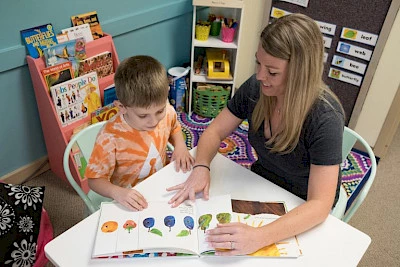Little Rock Professional Advises Parents to Seek Early Intervention
Monitoring whether or not your child is meeting age appropriate milestones is an important way to determine if their development is on track. If a child is not meeting his or her milestones at the correct age, that could be an indicator of an underlying developmental delay. Identifying those delays and seeking early intervention is key to helping children get back on track.
 Kimberly Newton, Licensed Psychological
Kimberly Newton, Licensed Psychological
Examiner, ACCESS Evaluation and Resource Center Director, President of the Learning Disabilities Association of Arkansas.
Kimberly Newton, Licensed Psychological Examiner, Director of the ACCESS Evaluation and Resource Center Director, and President of the Learning Disabilities Association of Arkansas, spends her days administering comprehensive evaluations to youth and adolescents to help identify developmental delays, language and learning disabilities, and more. According to Kim, the earlier a delay or disability can be identified, the better. Through early intervention services, many children can close developmental gaps. Since parents know their children better than anyone, Kim encourages them not to be afraid to speak up if you notice something is off. Understanding why a delay may be present is the first step to setting a child up for future success.
My child is almost two years old. How much should she be talking?
Though children develop at their own pace and the range of what’s considered “normal” development is quite broad, there are some standard guidelines you can use to know if your child is meeting certain developmental milestones. By two years of age, your child should use and understand at least fifty words, use two-word phrases without imitating or repeating, and use speech to communicate more than immediate needs.
What does it mean if my toddler isn’t using words to communicate?
Every child develops differently, but some differences may simply indicate a slight delay while others may be a cause for greater concern. A moderate to severe speech or language delay can be an indicator of an underlying delay or disability. There are a wide variety of reasons a child may experience a delay in language development, including language or learning disabilities, difficulty controlling the muscles used for speech, hearing loss, or autism spectrum disorders.

Rachel Biedron, ACCESS Speech-Language Pathologist, works with children to develop age-appropriate language skills.
What should I do if I suspect my child may not be talking as much as he should?
Vocabulary at age three is the number one indicator of academic success by the end of second grade. If you think that your child is not talking at the same pace or in the same way as most children his or her age, talk first to your child’s pediatrician. Local evaluation centers such as the ACCESS Evaluation and Resource Center in Little Rock can also help determine or rule out the possibility of a language or learning disability or a developmental delay. Detecting delays early and getting needed intervention is so important and ensures that your child is on track to reach his or her fullest potential.
Learn more about the ACCESS Evaluation Resource Center or call ACCESS at 501.217.8600 to talk to an admissions specialist.